This post is also available in: Español
This Day of the Dead recipe for cempasúchil atole is an easy-to-make warm drink perfect for enjoying along with pan de muerto or other traditional Day of the Dead foods for Dia de los Muertos. You can make this easy marigold recipe in thirty minutes or less. The cempasuchil flowers give this atole a unique citrusy flavor and infuse this warm and comforting Mexican hot drink with the symbolism of marigolds for the Day of the Dead.
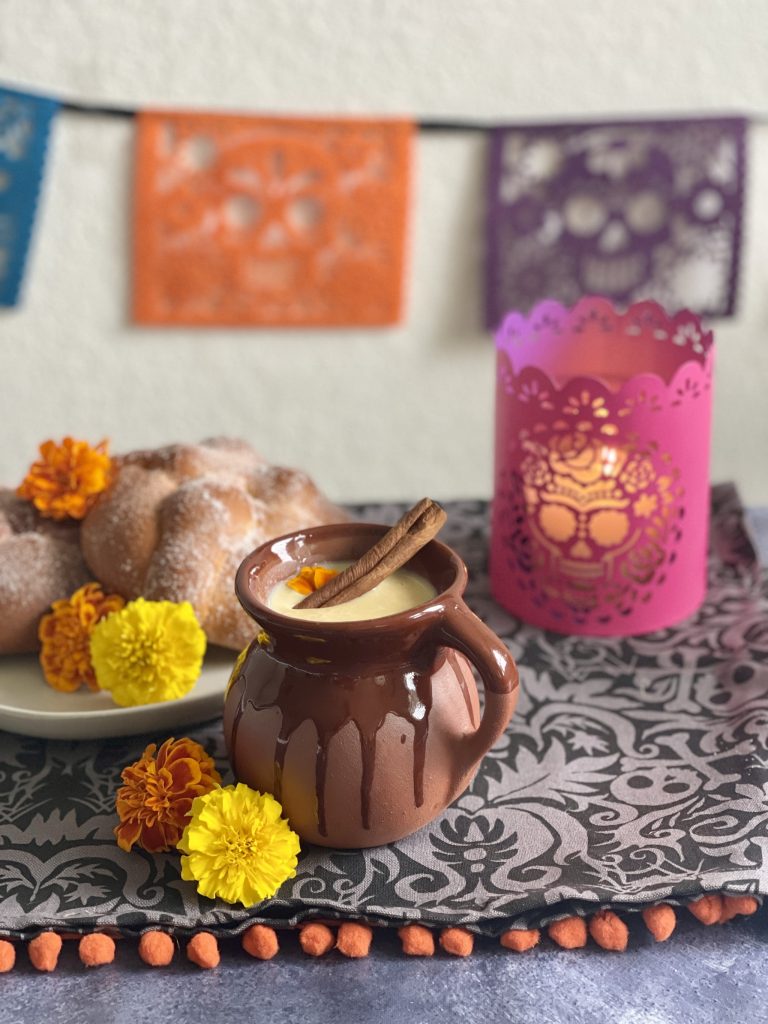
This Marigold (Cempasuchil) Atole recipe is warm and comforting during the chillier months. It carries a special significance for Dia de los Muertos, the Day of the Dead. By incorporating marigold petals into a traditional Mexican atole de Maizena recipe, you can infused it with added meaning, paying homage to a symbol deeply rooted in Mexican cultural heritage. This atole is so easy to make it’s a great Day of the Dead activity for kids.
The Cultural Significance of Marigolds in Dia de los Muertos
Marigolds, known as cempasúchil in Spanish, hold a significant place in the heart of Day of the Dead celebrations. Their roots trace back to indigenous Mexican civilizations, where they were revered for their vibrant color and intense aroma. Marigolds are more than just beautiful flowers; they symbolize the ephemeral nature of life and death’s ever-present role.
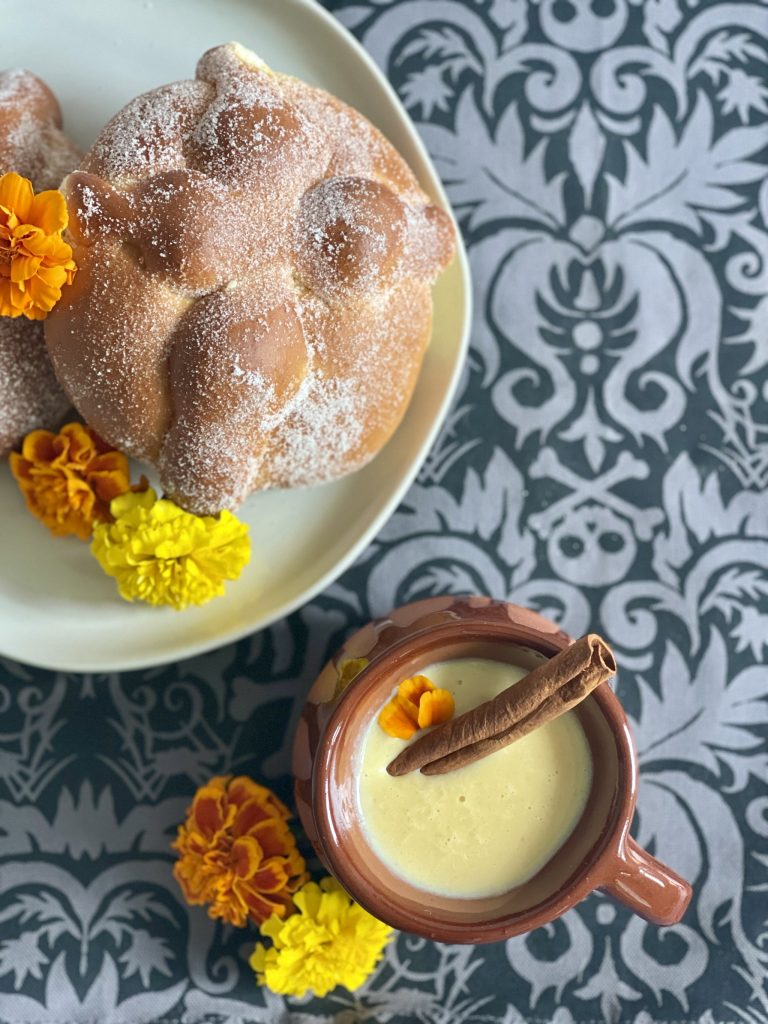
During Dia de los Muertos, marigolds are used in ofrendas, or altars, to honor deceased loved ones. Their bright orange and yellow petals are believed to guide the spirits back to the world of the living. By including marigolds in your atole recipe, you’re not only adding a unique flavor but also a touch of cultural meaning. It’s a way of connecting with the traditions and rituals that make Dia de los Muertos so special, making your atole more than just a beverage—it becomes a tribute to the enduring spirit of this celebration. You can read more about the significance and symbolism of marigolds for Day of the Dead here. And read about other Day of the Dead flowers used to decorate the ofrendas.
Are marigolds edible?
Yes, many varieties of marigolds are edible. However, you should only eat the flower petals, not the flower centers, and ensure the flowers are organic and have no pesticides.
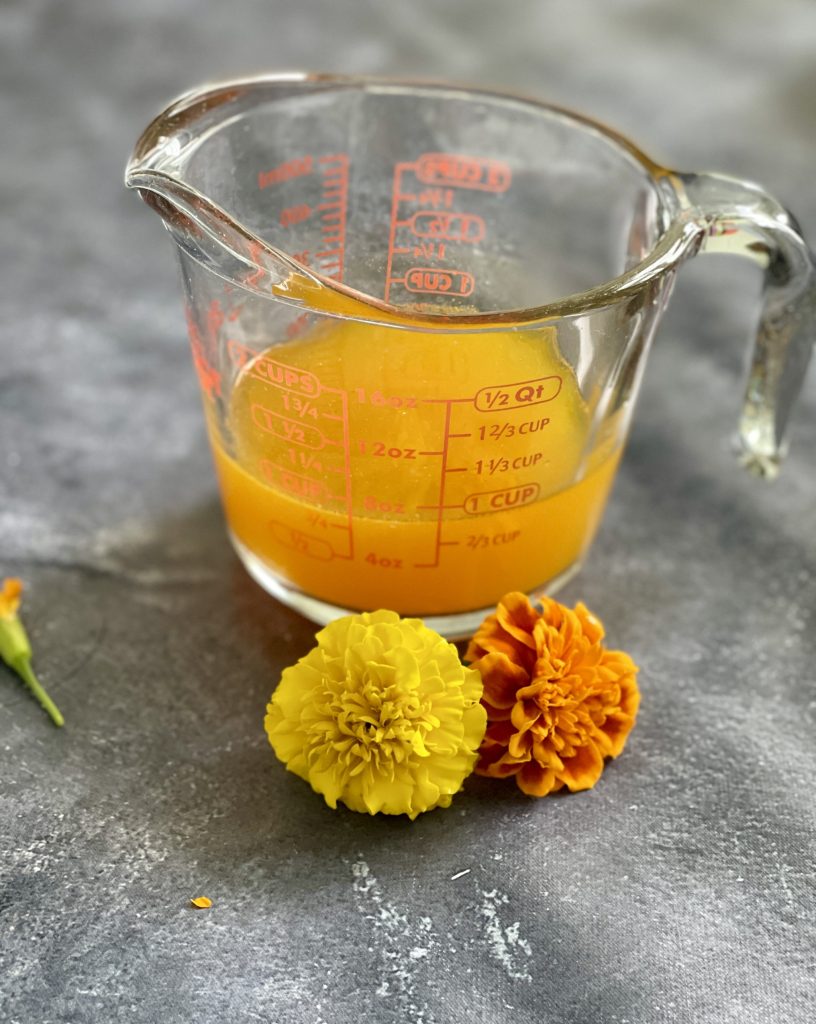
Here is a list of the marigold varieties that are safe for consumption:
- Mexican, Aztec marigold or cempasúchil (Tagetes erecta)
- French marigold (Tagetes patula)
- Lemon or signet marigold (Tagetes tenuifolia)
- Pot or common marigold (Calendula officinalis)
- Field marigold (Calendula arvensis)
- Mexican mint marigold (Tagetes lucida)
These marigold species can be used in cooking, although calendula types might taste slightly bitter. I recommend using Aztec or Mexican marigolds (cempasuchil) or French Marigolds for this recipe. Mexican Marigolds (Cempasuchil) can be a bit challenging to find outside of Mexico, so French Marigolds are a more accessible choice if you want to use fresh flowers.
Tips for safe consumption of Marigolds
While marigolds are edible, there are a few things you need to do to make sure that the flowers you are using to cook with are safe.
- Only eat the petals. In the case of Marigolds, only the petals are edible. Pluck the petals from the flower and make sure not to eat the entire flower; you can still use it for decorating your marigold recipes but do not eat the sepal, pistil, and stamens (the base of the flower and all parts of the flower’s center).
- Look for marigolds that are safe to eat. Look for flowers that are labeled as edible or culinary marigolds, or use organic marigolds from home gardens or local sources. These are grown without harmful chemicals, making them safe for consumption. Better yet, grow your organic marigolds at home! Avoid getting marigolds from garden centers or florists, as they usually have pesticides that aren’t food-friendly. You can also get edible cempasuchil (marigolds) online here.
- Wash and disinfect your marigolds before using them. You can soak them in a baking soda mixture (2 tablespoons of NaHCO3 per liter of water) for a few minutes to eliminate potential chemical traces. Afterward, treat them like any other vegetable by washing and disinfecting them.
Recipe for Cempasuchil Atole
This easy recipe for cempasuchil (marigold) atole is sure to become one of your new favorite Day of the Dead recipes!
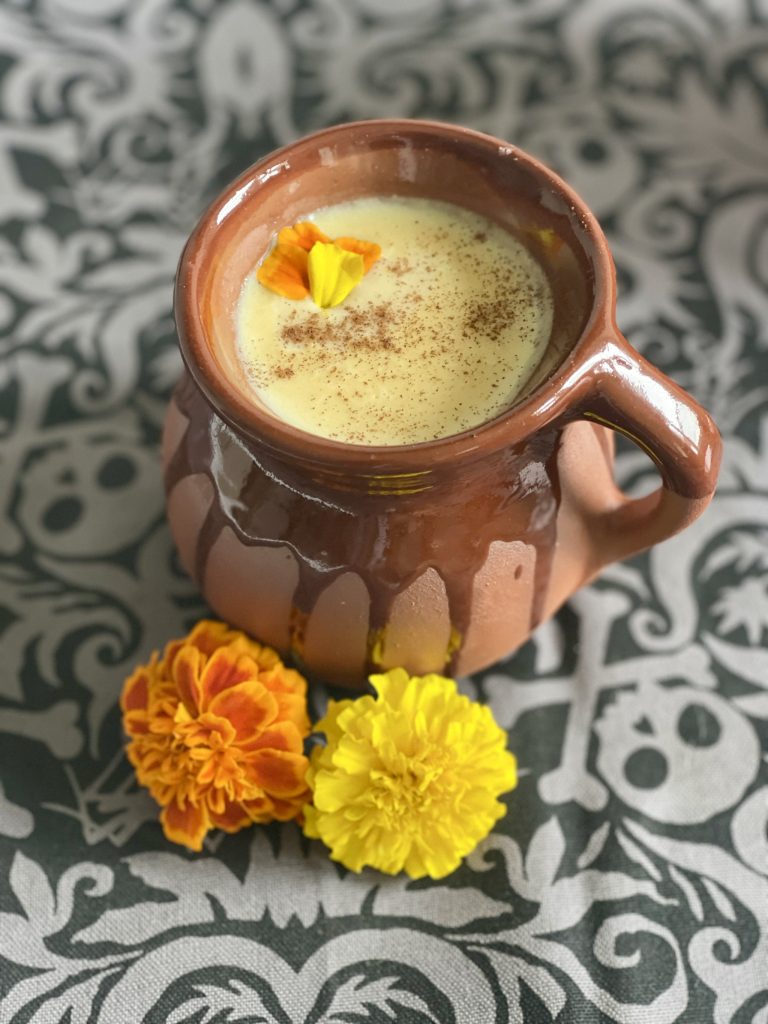
Ingredients for marigold (cempasuchi) atole:
- 4 organic marigold flowers, petals only
- 1 cup of water
- 3 tablespoons of Maizena Cornstarch (available at Walmart and Mexican grocery stores)
- 4 cups of skimmed milk
- 4 tablespoons of grated piloncillo (unrefined sugar) or brown sugar
- 1 teaspoon of vanilla or orange flavor
- 1 cinnamon stick
Instructions for making marigold (cempasuchil) atole:
- Disinfect the petals using a vegetable wash. Follow the instructions on the package.
- Add 1 cup of water and the flower petals to a blender until the petals have disintegrated and you have a bright orange liquid.
- Strain and set aside.
- Dissolve the Maizena in 1 cup of milk.
- Heat the remaining 3 cups of milk with the piloncillo and cinnamon.
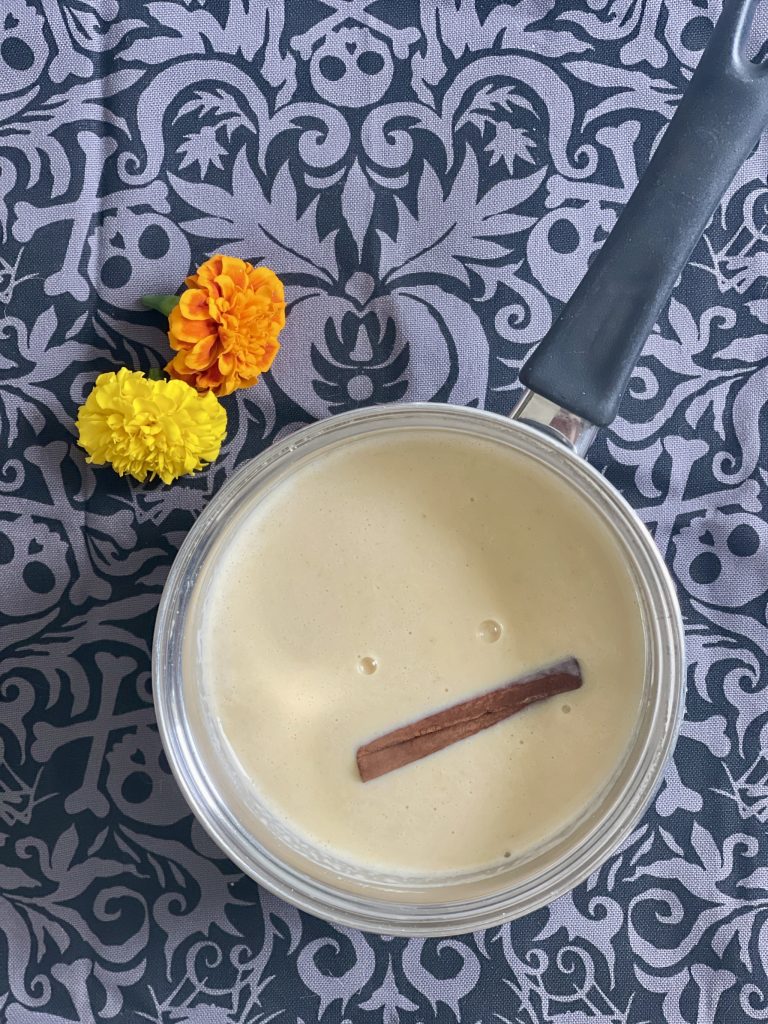
- Remove the cinnamon stick.
- Pour the previously blended marigold mixture and the diluted Maizena® into the heated milk.
- Cook over medium heat, stirring continuously, until it thickens to a creamy consistency.
- Serve in a ceramic mug and garnish with fresh marigold petals or a cinnamon stick.

Variation: Using Dried Marigold Flowers for Your Marigold Atole
If you’re using dried marigold flowers instead of fresh ones for this recipe, consider the following suggestions:
- Rehydrate the Dried Flowers: Soak the dried marigold flowers in 1 cup of warm water for about 10-15 minutes until they become pliable and regain some moisture. You can use this same water for your atole.
- Adjust Quantity: Dried flowers are more concentrated in flavor and aroma compared to fresh ones. Use about half the amount of dried marigold petals compared to fresh petals called for in the recipe.
- Experiment with Flavor: Dried marigold flowers may have a more intense flavor, so taste your atole to avoid overpowering the flavors.

Tips for Making the Best Mexican Atole de Cempasuchil:
Here are some tips for making the best marigol atole de maizena:
- Sift the Cornstarch: Before adding cornstarch to the mixture, sift it. This helps prevent lumps and ensures a smooth consistency in your atole.
- Mix Cornstarch with Cold Milk: To avoid lumps, mix the cornstarch with a small amount of cold milk to form a smooth paste before adding it to the rest of the milk.
- Stir Constantly: While cooking, stir the mixture constantly to prevent it from sticking to the bottom of the pan and forming lumps. A whisk can be helpful for achieving a smooth texture.
- Serve Hot: Atole is traditionally served hot. Make sure to serve it immediately after cooking for the best taste and texture.
- Adjust The Consistency: The thickness of atole can vary. If you prefer a thinner consistency, add more milk. For a thicker consistency, use less milk or more cornstarch.
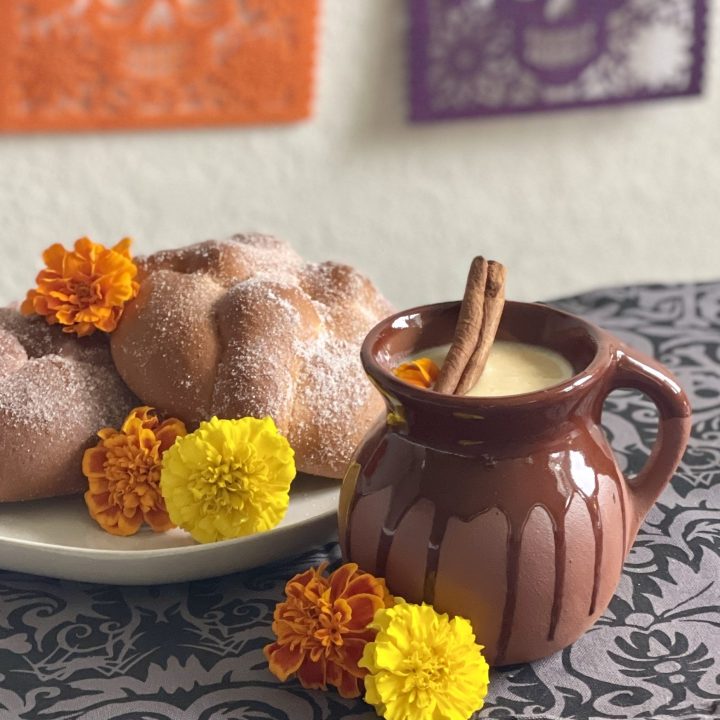
Cempasuchil (Marigold) Atole Recipe for the Day of the Dead
Ingredients
- 4 organic marigold flowers, petals only
- 1 cup of water
- 3 tablespoons of Maizena Regular Cornstarch
- 4 cups of skimmed milk
- 4 tablespoons of grated piloncillo (unrefined sugar) or brown sugar
- 1 teaspoon of vanilla or orange blossom essence
- 1 cinnamon stick
Instructions
- Instructions for making marigold (cempasuchil) atole:
Disinfect the petals using a special food-safe solution. Follow the instructions on the package. - Add 1 cup of water and the flower petals to a blender until the petals have completely disintegrated and you have a bright orange liquid.
- Strain, and set aside.
- Dissolve the Maizena in 1 cup of milk.
Heat the remaining 3 cups of milk with the piloncillo and cinnamon. - Remove the cinnamon stick.
- Pour the previously blended marigold mixture along with the diluted Maizena into the heated milk.
- Cook over medium heat, stirring continuously, until it thickens to a creamy consistency.
- Serve in a ceramic mug and garnish with some fresh marigold petals or with a cinnamon stick.
Nutrition Information:
Yield: 4 Serving Size: 1Amount Per Serving: Calories: 122Total Fat: 0gSaturated Fat: 0gTrans Fat: 0gUnsaturated Fat: 0gCholesterol: 5mgSodium: 107mgCarbohydrates: 21gFiber: 1gSugar: 18gProtein: 9g
Other Day of the Dead Recipes You Might Enjoy!
Spicy Mexican Hot Chocolate
Indulging in a cup of spicy Mexican hot chocolate is like taking your taste buds on an exciting journey through history and culture. This delightful beverage combines the warmth of traditional hot chocolate with the fiery kick of chili peppers, creating a unique and unforgettable experience.
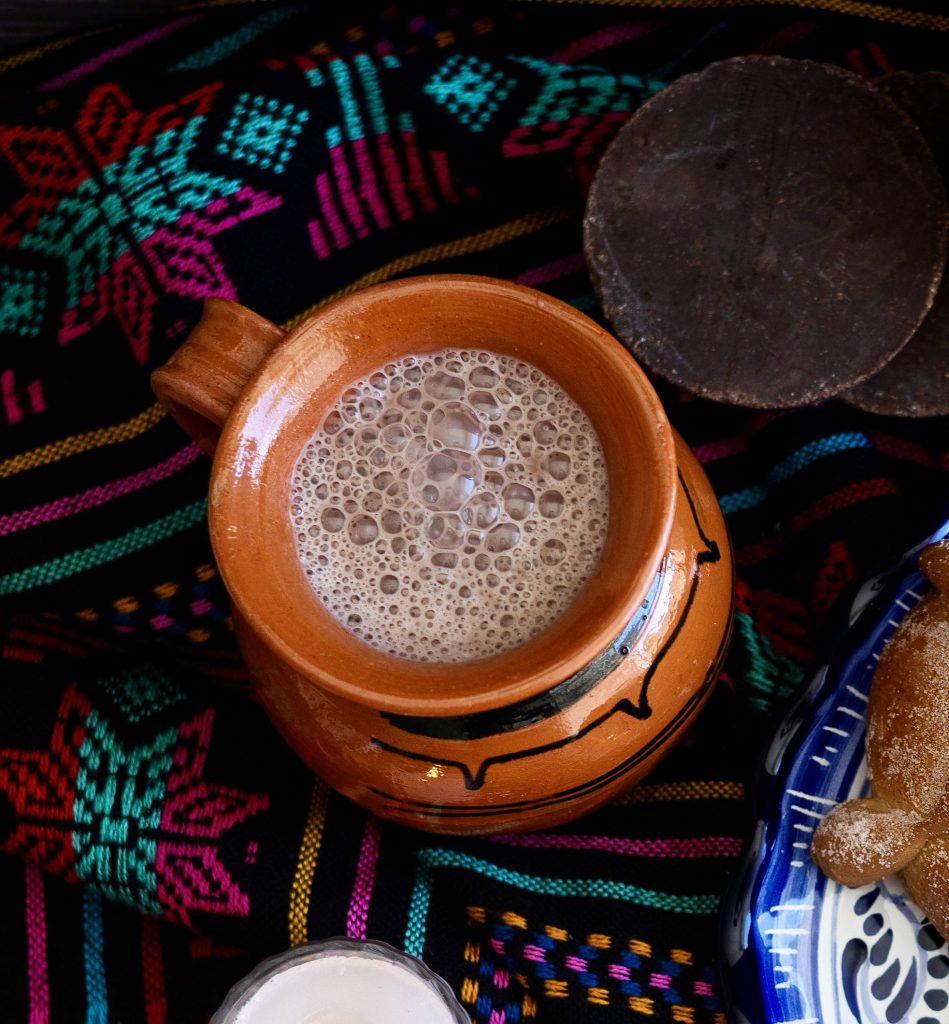
Cempaseuchil (Marigold) Flan
This delicious version of the traditional Mexican flan with marigold or cempasuchil flowers is the perfect Day of the Dead dessert. The marigold flowers not only give it a unique, slightly citrusy taste but they are also used to decorate the flan making it look beautiful and festive. This Día De Los Muertos dessert is sure to become a favorite!
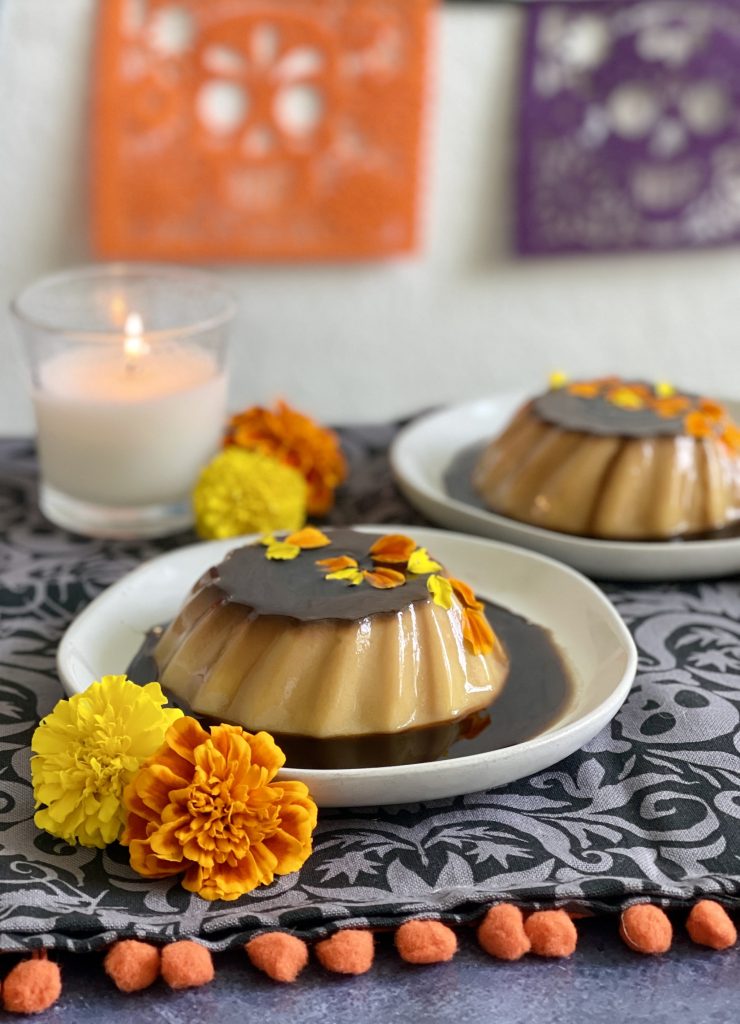
Cempasuchil (Marigold) Filled Pan de Muerto
Give the tradional pan de muerto a twist by filling it with a Cempasuchil, or marigold flower cream. The marigold sweet cream filling made with cream cheese, condensed milk and infused with the subtle taste of marigolds not only makes this pan de muerto taste delicious but it enhances it’s symbolic significance for your Day of the Dead celebrations.


